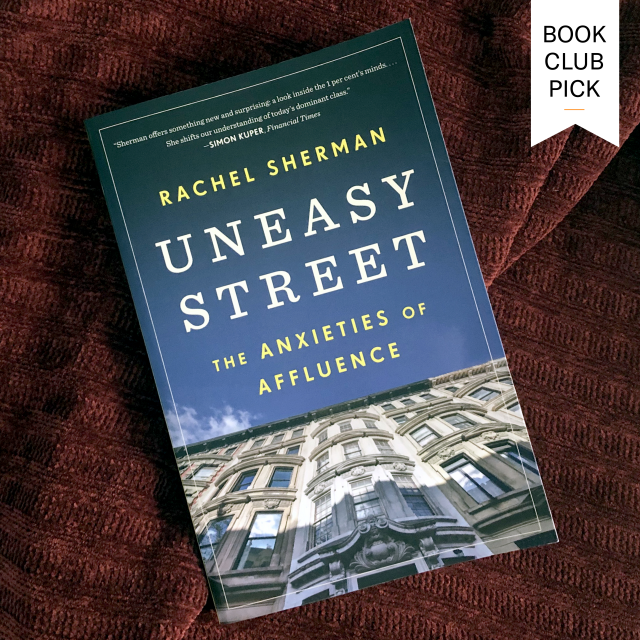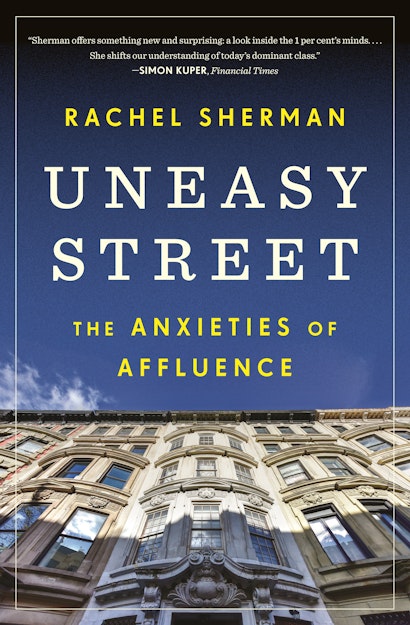This month’s Book Club Pick is Uneasy Street by Rachel Sherman. This is an excellent non-fiction summer book club selection for readers who are curious about the lives of the 1%. From TV’s “real housewives” to Succession, our popular culture portrays wealthy people as materialistic and entitled. But what do we really know about how these people live? In this book, Sherman draws on rare in-depth interviews that she conducted with fifty affluent New Yorkers—from hedge fund financiers and artists to stay-at-home mothers—to examine their lifestyle choices and understanding of privilege. Writing about the book in the New York Times Book Review, John Williams notes, “Sherman takes a dispassionate approach to find out how those who are ‘benefitting from rising economic inequality’ experience ‘their own social advantages.’ She elicits her subjects’ thoughts about work and productivity, charitable giving, marital discord and more. Worthwhile humanizing ensues, as do plenty of squirm-inducing moments.” It’s an absorbing and illuminating read that is sure to lead to animated discussion. It’s a great choice for fans of Wednesday Martin’s Primates of Park Avenue or Michael Gross’s 740 Park.
The discussion questions below are meant to guide your conversations, and we encourage you to share highlights from your discussion—and pictures!—via social media, using hashtag #ReadPUPforBookClub.
Discussion Questions
- Sherman discusses the challenges of defining “the elite,” and she developed a set of criteria for choosing her participants. Who counts as “elite” to you? Is it based on income, wealth, education, or job? In what ways do public figures such as politicians and celebrities seem “elite” or not?
- Sherman notes that there is an American cultural taboo against discussing money and class. Some of her respondents even suggested that they would not tell their partners that they had shared details with her. How do you feel about discussing your own financial situation? With whom are you comfortable discussing it? Are there other topics that are similarly “off limits”?
- Sherman conducted her interviews in New York City, one of the most unequal cities in the United States, at a time when economic disparities were especially prominent. How might the story have changed if she interviewed people in a different city?
- Sherman identifies “upward-oriented” and “downward oriented” people in her sample. Do you tend to compare yourself to people who have as much or more than you, or to those who have less? Do you think of yourself as privileged? Why or why not?
- Do the criteria Sherman identifies for being a morally worthy wealthy person—working hard, consuming prudently, giving back, and in general trying to be “normal”—resonate with you? Do you make these distinctions or see them in the culture at large?
- In explaining their success, Sherman’s respondents often refer to how hard they have worked. They often emphasize the role of luck, too. Sherman suggests that this obscures other advantages, such as elite educations, lack of debt, financial support from their parents, etc. Do you agree? What is the difference between ‘hard work’ and ‘luck’ as explanations for having wealth?
- When asked what ‘giving back’ meant, Sherman’s interviewees talked about charitable giving, volunteering, and having awareness of privilege. How do you define giving back? What do you think the purpose of “giving back” is?
- Sherman’s respondents had mixed feelings about the value of teenagers working for pay in high school and college. Some felt it was a necessary experience. Others felt that a job would take away from other activities, including schoolwork. Do you think it is important for teenagers to hold paying jobs? Why or why not?
- In the appendix, Sherman notes that she comes from a privileged background, which was useful in connecting with some of her interviewees. How might her interviewees have responded differently if she had a different background?
- Have your perceptions of wealthy Americans changed after reading Uneasy Street? In what ways?
About the Author
Rachel Sherman teaches sociology at the New School for Social Research and Eugene Lang College. She is the author of Class Acts: Service and Inequality in Luxury Hotels.

